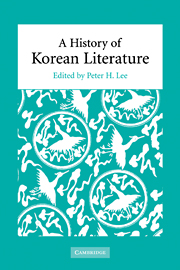Book contents
- Frontmatter
- Contents
- List of illustrations
- List of contributors
- Preface
- Note on the text
- Korean dynasties
- Glossary
- East Asia
- Principal places in works discussed
- Introduction
- 1 Language, forms, prosody, and themes
- 2 From oral to written literature
- 3 Hyangga
- 4 Silla writings in Chinese
- 5 Koryŏ songs
- 6 Koryŏ writings in Chinese
- 7 Early Chosŏn eulogies
- 8 Early Chosŏn sijo
- 9 Early Chosŏn kasa
- 10 Late Chosŏn sijo
- 11 Late Chosŏn kasa
- 12 Chosŏn poetry in Chinese
- 13 Chosŏn fiction in Chinese
- 14 Chosŏn fiction in Korean
- 15 P'ansori
- 16 Folk drama
- 17 Literary criticism
- 18 Early twentieth-century poetry
- 19 Early twentieth-century fiction by men
- 20 Early twentieth-century fiction by women
- 21 Late twentieth-century poetry by men
- 22 Late twentieth-century poetry by women
- 23 Late twentieth-century fiction by men
- 24 Late twentieth-century fiction by women
- 25 Literature of North Korea
- Bibliography
- Suggestions for further reading
- Index
23 - Late twentieth-century fiction by men
Published online by Cambridge University Press: 22 September 2009
- Frontmatter
- Contents
- List of illustrations
- List of contributors
- Preface
- Note on the text
- Korean dynasties
- Glossary
- East Asia
- Principal places in works discussed
- Introduction
- 1 Language, forms, prosody, and themes
- 2 From oral to written literature
- 3 Hyangga
- 4 Silla writings in Chinese
- 5 Koryŏ songs
- 6 Koryŏ writings in Chinese
- 7 Early Chosŏn eulogies
- 8 Early Chosŏn sijo
- 9 Early Chosŏn kasa
- 10 Late Chosŏn sijo
- 11 Late Chosŏn kasa
- 12 Chosŏn poetry in Chinese
- 13 Chosŏn fiction in Chinese
- 14 Chosŏn fiction in Korean
- 15 P'ansori
- 16 Folk drama
- 17 Literary criticism
- 18 Early twentieth-century poetry
- 19 Early twentieth-century fiction by men
- 20 Early twentieth-century fiction by women
- 21 Late twentieth-century poetry by men
- 22 Late twentieth-century poetry by women
- 23 Late twentieth-century fiction by men
- 24 Late twentieth-century fiction by women
- 25 Literature of North Korea
- Bibliography
- Suggestions for further reading
- Index
Summary
Although Korea was liberated from Japanese colonial rule in 1945, the country faced national division due to its inability to overcome ideological contention and conflict. The tragic experience of colonialism was relived through fiction that critically examined the humiliating circumstances of the time. Fiction also established a new direction for life within the “liberation space” (haebang konggan) – the space between colonial liberation and the beginning of the Korean War. During the post-liberation period, creative practices centered on assigning meaning to the new life and understanding the social conditions and demands that accompanied the new freedom from colonialism. Most fictional works focused on realism by problematizing the notion of understanding reality.
FICTION DURING THE “LIBERATION SPACE”
Among the works published during the post-liberation period that hold significant historical weight are those that appropriated the colonial experience into the fictional realm and examined it critically. In Pak Chonghwa's Ch'ŏngch'un sŭngni (Youth's Victory, 1949), Pak Nogap's Sasimnyŏn (Forty Years, 1948), and An Hoenam's “P'okp'ung ŭi yŏksa” (“Tumultuous History,” 1947), the authors describe colonial experience with a critical eye. Realistic portrayals in fictional works within the space of liberation are embodied in Kye Yongmuk's “Pyŏl ŭl henda” (“Counting the Stars,” 1946), Chi Haryŏn's “Tojŏng” (“Journey,” 1946), Hŏ Chun's Chandŭng (Lamplight, 1948), Yi Kŭngyŏng's “T'angnyusogŭl kanŭn Pak kyosu” (“Professor Pak who Walks the Muddy Stream,” 1948), Yŏm Sangsŏp's “Ihap” (“Meeting and Parting,” 1948), Hwang Sunwŏn's “Sul iyagi” (“Liquor Story,” 1946), Ch'oe Chŏnghŭi's “P'ungnyu chap'inŭn maŭl” (“Landowner Sŏ's Birthday Celebration,” 1947), and Pak Yŏngjun's “Kohyang ŏmnŭn saram” (“People without Hometowns,” 1947).
- Type
- Chapter
- Information
- A History of Korean Literature , pp. 468 - 480Publisher: Cambridge University PressPrint publication year: 2003



